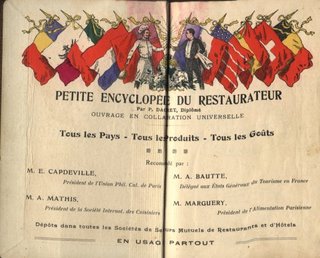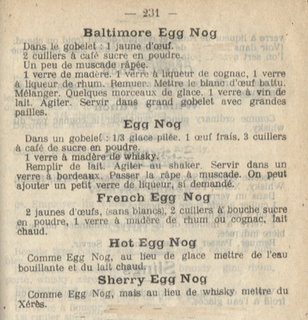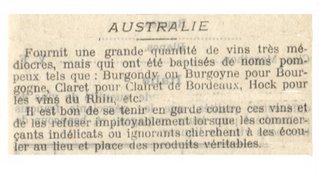Interlude
Frequently Advent begins on the Sunday immediately following Thanksgiving. This year there are ten days between Thanksgiving (November 23rd) and the first Sunday in Advent (December 3rd), the traditional beginning to the four-week runup to Christmas.
The end of the Amerloque family's Thanksgiving weekend usually means locating the boxes and crates of Christmas decorations, feverishly unpacking them, and putting various treasured items of Christmas cheer on display: wreaths: garlands, elves, reindeer. With a ten-day interlude until Advent ths year, there is far less hustle and bustle. Turkey leftovers usually figure prominently in the weekend table fare, as unpacking the boxes with a semblance of order is fiendishly hard work. There was a change this time around; though, given the leisurely pace. Last year the family had settled on a jambon de Prague to accompany the traditional turkey on The Day, given the supposed looming risks of avian flu. The ham turned out so well and was such a hit with everyone that it was decided this year to cook and serve a Prague ham for Sunday lunch to close out the Thanksgiving weekend. It was excellent, with a nice Burgundy (Cote de Nuits-Villages 2002) to accompany it.
The meal was followed, in the very late afternoon, by the first eggnog of the 2006 Christmas season.

One hears frequently that "l'eggnog est Anglo-Saxon - il n'y en a pas en France". Amerloque thought for a long, long time that eggnog was utterly unknown in France, until one day, when browsing in a somewhat run-down bookstore in a provincial French spa town, he came across a volume which now occupies pride of place in Amerloque's library. It's the Petite Encyclopédie du Restaurateur originally penned by one P. Dagouret in 1900. It is a fascinating compendium of information; collected from a wide variety of sources, providing the names and recipes of many dishes native to France - and from selected countries throughout the world. Just the names of the soupes are enough to make one's head spin: a selection from the letter "B" is typical of the author's thoroughness: Bagration, Balvais, Balzac, Batwinia, Bergère, Bière, Bisque(s), Bloum, Bohémienne, Bonne femme, Bortsch, Botzaris, Bouchère, Bouquetière, Brésilien, Britania, Brunoise,and Buséga. There are even recipes for bear (Cuissot Cumberland, François-Joseph, Grand Veneur and Venaison) and gazelle (marinée et piquée), if one is so inclined in this Year of Grace 2006.
On page 231 the list of "Nogs" begins. There are five in all , including the "French Egg Nog" ! Proof positive that "Egg Nog" was known in France a good one hundred years ago !

Needless to say, down through the years Amerloque has tried all the nogs given so willingly by Monsieur Dagouret . The "French Egg Nog" is actually not bad at all - if the eggs are freshly-laid. Given that the title of the recipe is in English, of course, it would be a rash commentator indeed who would assert that the eggnog is firmly rooted in French tradition: if it were, wouldn't its name be in French ?
If one is searching for a suitable beverage to accompany one's forthcoming Christmas meals, one can do far, far worse nowadays than settling for a good Australian wine. The varieties and vintages currently available are as good as any coming from any of the other so-called "New World producers", in Amerloque's view: California, Chile, and South Africa spring to mind. Apparently one hundred years ago, however, Australian wine was not very good, according to Monsieur Dagouret, who devotes a slew of pages to French wines and digresses but summarily into Austro-Hungarian, Mexican, Italian and Spanish wines. His comment about wines from down under is edifying:

"AUSTRALIA
Supplies a large quantity of very mediocre wines, but which have been christened with pretentious names such as: Burgondy or Burgoyne for Bourgogne, Claret for Clairet de Bordeaux, Hock for the wines of the Rhine, etc.
It is a good idea to beware of these wines and to refuse them mercilessly when dishonest or ignorant shopkeepers try to pawn them off in place of the genuine product."
One wonders indeed about the Australian wines available to Monsieur Dagouret in Paris in 1900 – perhaps at the Exposition Universelle ?
The Christmas season in Paris – and throughout France - is marvelous: Amerloque wrote about it at length last year, but he didn't address the issue of étrennes. In Amerloque's neighborhood, the week to come is the time when the doorbell rings in the evening (before dinner, of course !) … one opens the door to find a postperson, a fireman, or simply one's concierge, passing smilingly by to pick up his or her étrennes, that is, end-of-the-year gratuity. The postmen and postwomen, as well as the fireman, are usually selling calendars. They purchase these wholesale with their own money and are allowed by law to pocket the sums collected in exchange for the calendars. It a legal and honorable French tradition: one that the expatriate would do well to honor, in Amerloque's view.
If one doesn't want to give money for some reason, one is in good company, indeed: in 1847, did not Eugène Labiche come out with a one-act vaudeville play called L'Art de ne pas donner d'étrennes ?
The Amerloque family always dispenses étrennes, since the sale of calendars helps the sellers and the sellers' families, given the relative pittances they earn. It is also an annual gesture of appreciation to people working for the society – sometimes at quite a bit of personal risk, in the case of firemen - whom the Amerloque family sees every day. It should be noted, too, that the étrennes are generally considered to be part and parcel of a concierge's salary. A concièrge is not a gardien, by the way, and the terms should never be used interchangeably, since the work contracts, rights and duties are most definitely not the same. A genuine concierge expects a sum approximately equivalent to 10% of one's monthly rent. If one makes heavy use of one's concierge, one should give considerably more, especially if one requests the concierge to walk the dog, or water the flowers. or run errands to the pharmacie, or open the apartment and whip up a quick gouter when the kids come back from school on a drizzly afternoon.
There is some question as to whether or nor the éboueurs (trash collectors) are legally entitled to solicit étrennes. A prefectoral decree in 1936 apparently prohibits municipal employees from collecting étrennes. However, some case law has allegedly stated – if the newspapers are to be believed - that if the city has subcontracted out its trash collection to a private company, then those working for the private firm can collect étrennes. Certainly the system is subject to abuse: the homeowner should be careful when it comes to éboueurs, who should be able to present valid ID on request, even though they may be wearing a uniform.
"Christmas is coming, the geese are getting fat !" Amerloque located and unpacked his collection of Christmas CDs (several hundred !) after the eggnog and jambon de Prague. He is now looking forward to weeks of traditional carols and classical music. Alvin and the Chipmunks (Christmas Don't Be Late), although quite memorable, are certainly not for him.
Now to the business of unpacking the other Christmas boxes and visitng the various upcoming American holiday activities in Paris ! A bientôt !
L'Amerloque
Text © Copyright 2006 by L'Amerloque
The end of the Amerloque family's Thanksgiving weekend usually means locating the boxes and crates of Christmas decorations, feverishly unpacking them, and putting various treasured items of Christmas cheer on display: wreaths: garlands, elves, reindeer. With a ten-day interlude until Advent ths year, there is far less hustle and bustle. Turkey leftovers usually figure prominently in the weekend table fare, as unpacking the boxes with a semblance of order is fiendishly hard work. There was a change this time around; though, given the leisurely pace. Last year the family had settled on a jambon de Prague to accompany the traditional turkey on The Day, given the supposed looming risks of avian flu. The ham turned out so well and was such a hit with everyone that it was decided this year to cook and serve a Prague ham for Sunday lunch to close out the Thanksgiving weekend. It was excellent, with a nice Burgundy (Cote de Nuits-Villages 2002) to accompany it.
The meal was followed, in the very late afternoon, by the first eggnog of the 2006 Christmas season.

One hears frequently that "l'eggnog est Anglo-Saxon - il n'y en a pas en France". Amerloque thought for a long, long time that eggnog was utterly unknown in France, until one day, when browsing in a somewhat run-down bookstore in a provincial French spa town, he came across a volume which now occupies pride of place in Amerloque's library. It's the Petite Encyclopédie du Restaurateur originally penned by one P. Dagouret in 1900. It is a fascinating compendium of information; collected from a wide variety of sources, providing the names and recipes of many dishes native to France - and from selected countries throughout the world. Just the names of the soupes are enough to make one's head spin: a selection from the letter "B" is typical of the author's thoroughness: Bagration, Balvais, Balzac, Batwinia, Bergère, Bière, Bisque(s), Bloum, Bohémienne, Bonne femme, Bortsch, Botzaris, Bouchère, Bouquetière, Brésilien, Britania, Brunoise,and Buséga. There are even recipes for bear (Cuissot Cumberland, François-Joseph, Grand Veneur and Venaison) and gazelle (marinée et piquée), if one is so inclined in this Year of Grace 2006.
On page 231 the list of "Nogs" begins. There are five in all , including the "French Egg Nog" ! Proof positive that "Egg Nog" was known in France a good one hundred years ago !

Needless to say, down through the years Amerloque has tried all the nogs given so willingly by Monsieur Dagouret . The "French Egg Nog" is actually not bad at all - if the eggs are freshly-laid. Given that the title of the recipe is in English, of course, it would be a rash commentator indeed who would assert that the eggnog is firmly rooted in French tradition: if it were, wouldn't its name be in French ?
If one is searching for a suitable beverage to accompany one's forthcoming Christmas meals, one can do far, far worse nowadays than settling for a good Australian wine. The varieties and vintages currently available are as good as any coming from any of the other so-called "New World producers", in Amerloque's view: California, Chile, and South Africa spring to mind. Apparently one hundred years ago, however, Australian wine was not very good, according to Monsieur Dagouret, who devotes a slew of pages to French wines and digresses but summarily into Austro-Hungarian, Mexican, Italian and Spanish wines. His comment about wines from down under is edifying:

"AUSTRALIA
Supplies a large quantity of very mediocre wines, but which have been christened with pretentious names such as: Burgondy or Burgoyne for Bourgogne, Claret for Clairet de Bordeaux, Hock for the wines of the Rhine, etc.
It is a good idea to beware of these wines and to refuse them mercilessly when dishonest or ignorant shopkeepers try to pawn them off in place of the genuine product."
One wonders indeed about the Australian wines available to Monsieur Dagouret in Paris in 1900 – perhaps at the Exposition Universelle ?
The Christmas season in Paris – and throughout France - is marvelous: Amerloque wrote about it at length last year, but he didn't address the issue of étrennes. In Amerloque's neighborhood, the week to come is the time when the doorbell rings in the evening (before dinner, of course !) … one opens the door to find a postperson, a fireman, or simply one's concierge, passing smilingly by to pick up his or her étrennes, that is, end-of-the-year gratuity. The postmen and postwomen, as well as the fireman, are usually selling calendars. They purchase these wholesale with their own money and are allowed by law to pocket the sums collected in exchange for the calendars. It a legal and honorable French tradition: one that the expatriate would do well to honor, in Amerloque's view.
If one doesn't want to give money for some reason, one is in good company, indeed: in 1847, did not Eugène Labiche come out with a one-act vaudeville play called L'Art de ne pas donner d'étrennes ?
The Amerloque family always dispenses étrennes, since the sale of calendars helps the sellers and the sellers' families, given the relative pittances they earn. It is also an annual gesture of appreciation to people working for the society – sometimes at quite a bit of personal risk, in the case of firemen - whom the Amerloque family sees every day. It should be noted, too, that the étrennes are generally considered to be part and parcel of a concierge's salary. A concièrge is not a gardien, by the way, and the terms should never be used interchangeably, since the work contracts, rights and duties are most definitely not the same. A genuine concierge expects a sum approximately equivalent to 10% of one's monthly rent. If one makes heavy use of one's concierge, one should give considerably more, especially if one requests the concierge to walk the dog, or water the flowers. or run errands to the pharmacie, or open the apartment and whip up a quick gouter when the kids come back from school on a drizzly afternoon.
There is some question as to whether or nor the éboueurs (trash collectors) are legally entitled to solicit étrennes. A prefectoral decree in 1936 apparently prohibits municipal employees from collecting étrennes. However, some case law has allegedly stated – if the newspapers are to be believed - that if the city has subcontracted out its trash collection to a private company, then those working for the private firm can collect étrennes. Certainly the system is subject to abuse: the homeowner should be careful when it comes to éboueurs, who should be able to present valid ID on request, even though they may be wearing a uniform.
"Christmas is coming, the geese are getting fat !" Amerloque located and unpacked his collection of Christmas CDs (several hundred !) after the eggnog and jambon de Prague. He is now looking forward to weeks of traditional carols and classical music. Alvin and the Chipmunks (Christmas Don't Be Late), although quite memorable, are certainly not for him.
Now to the business of unpacking the other Christmas boxes and visitng the various upcoming American holiday activities in Paris ! A bientôt !
L'Amerloque




